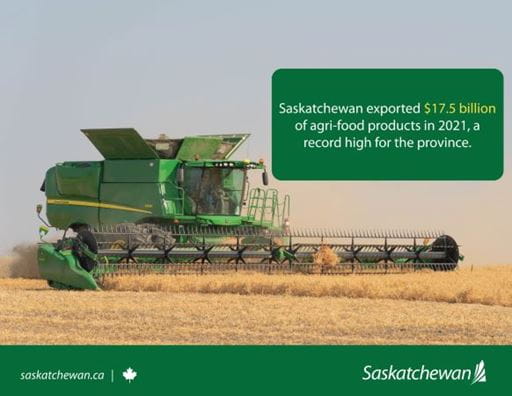Record Agricultural Exports for Saskatchewan in 2021
CANADA, February 14 - Released on February 14, 2022
Saskatchewan's agricultural exports were worth $17.5 billion in 2021 - setting another new record for the province.
The 2021 total was an increase of almost seven per cent over the record of $16.4 billion set in 2020, which itself surpassed the previous year by 27 per cent. Leading agri-food export commodities in 2021 continue to be canola seed, canola oil, non-durum wheat, lentils, durum and dry peas, with top international market destinations including the United States, China, Japan and Mexico.
"These record export numbers show Saskatchewan is in a strong position to continue producing and supplying the world-class agricultural products a growing world wants and needs," Trade and Export Development Minister Jeremy Harrison said. "Our growing export base is creating economic opportunity, good jobs and generating investment for communities across the province."

Agri-food exports represented nearly half of Saskatchewan exports in 2021, valued at $37.1 billion. Saskatchewan overcame challenges including infrastructure disruptions due to adverse weather events in British Columbia to remain one of Canada's leading agri-food exporters, with a global reputation as a consistent supplier of safe, high quality, sustainability-produced agri-food products.
Saskatchewan exported more than $2.6 billion in each of its key crop product sectors - cereal grains, oilseeds, pulses and edible oils - in 2021. Compared to 2020, canola oil saw an increase of over 50 per cent, with exports to the United States increasing 72 per cent from $1.1 billion to $1.9 billion. Canola oil to South Korea also experienced a dramatic increase of 106 per cent from $71 million to $146 million.
"Saskatchewan's agriculture industry is, and has always been, a significant part of our economy - with an impact that extends far beyond our provincial borders," Agriculture Minister David Marit said. "Our producers have fed the world for generations, and we continue to enable the innovation necessary to keep feeding the world's growing population, expected to be 10 billion people by 2050. These export figures prove once again that we're up to that challenge and well on the way to meeting the future goals we've set."
Saskatchewan has grown its agricultural exports by more than 56 per cent since 2012. The province's ongoing international market expansion plans are progressing with the establishment of new trade and investment offices in the United Kingdom, United Arab Emirates, Mexico and Vietnam in addition to existing offices in Japan, India, China and Singapore.
The value-added processing and agriculture sectors are major components of Saskatchewan's Growth Plan goals, which include increasing crop production to 45 million tonnes, agriculture exports to $20 billion, and value-added revenue to $10 billion by the end of this decade. The most recent example of progress toward these targets includes the announcement by Federated Co-operatives Ltd. of their plans to develop a renewable diesel facility as well as a canola crushing plant in Regina, in partnership with AGT Foods, with a capacity of 1.1 million tonnes and combined economic benefits estimated at $4.5 billion.
-30-
For more information, contact:
Jamie Shanks Agriculture Regina Phone: 306-787-5155 Email: jamie.shanks2@gov.sk.caRobin Speer Trade and Export Development Regina Phone: 306-519-5006 Email: robin.speer@gov.sk.ca
